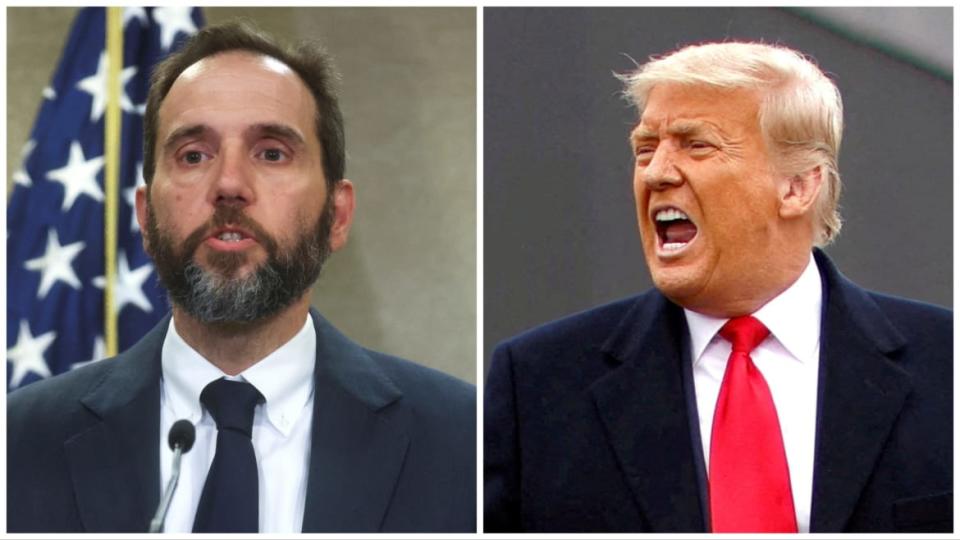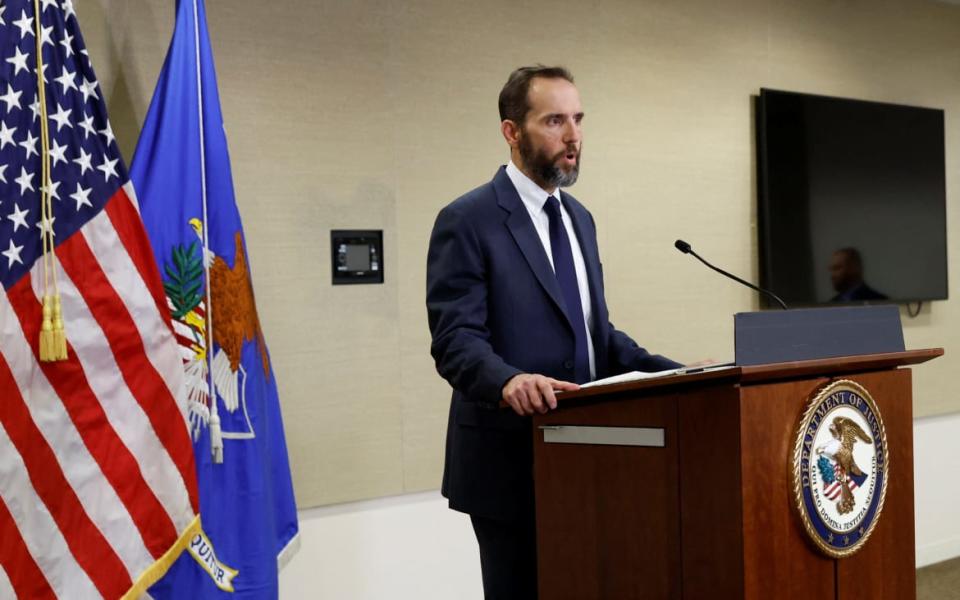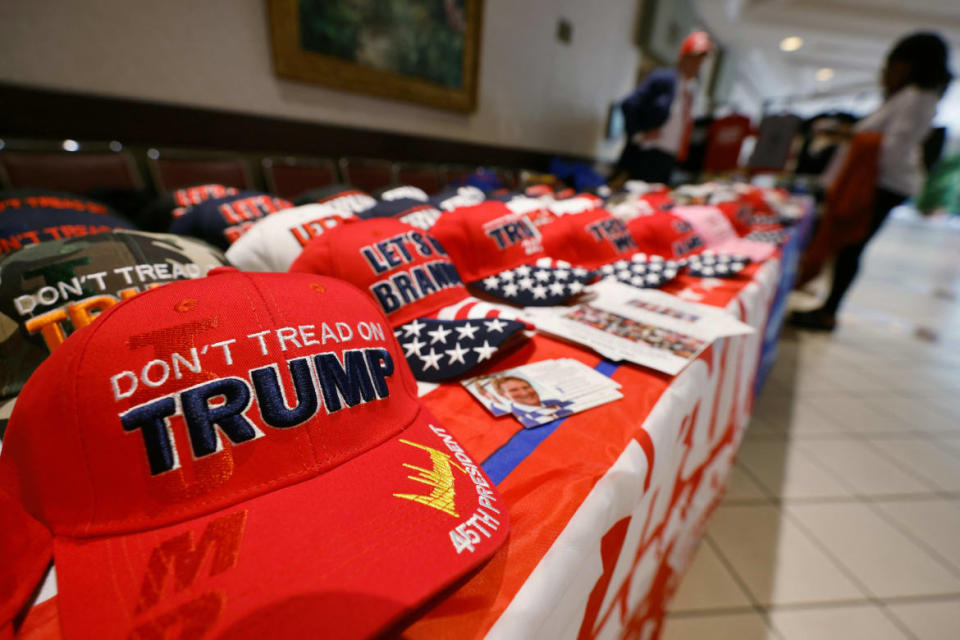What’s Next in Trump’s Indictment: Can He Still Run? Will He Pardon Himself?

After Donald Trump on Thursday earned the less-than-honorable distinction of becoming the first-ever current or former U.S. president to be indicted on federal charges, one question hung conspicuously in the air: what now?
For the twice-impeached former president, who stands charged with 37 felony counts related to the unlawful retention and mishandling of reams of sensitive government documents, it was a page out of the old playbook he’s relied on for years.
Trump on Friday morning jettisoned his lawyer James Trusty, along with co-counsel John Rowley, for Todd Blanche, a former federal prosecutor already representing Trump on state charges brought in April by Manhattan DA Alvin Bragg, and “a firm to be named later.” He’s slated to speak at a Republican confab on Saturday in Columbus, Georgia, and to speak again at the North Carolina GOP convention on Sunday. Then, on Tuesday, Trump will appear in Miami federal court to be arraigned on charges that include obstruction, conspiracy, false statements, and espionage.

A photo included in the federal indictment against Trump, showing a box of documents, including one classified document, spilled onto the floor of a storeroom at Trump's Mar-a-Lago club in Florida.
With primary season now underway, and Trump having declared his intent to retake the White House in 2024, now is when the rubber hits the road for Special Counsel Jack Smith, the former war crimes prosecutor Attorney General Merrick Garland appointed to oversee the unprecedented case. And the clock is now running for Smith and his team, according to legal experts.
What happens to the case if Trump wins in 2024?
If Trump manages to once again win the presidency in 2024—or if a Trump-friendly Republican winds up in the Oval Office—he or she “will be in a position to kill the case,” attorney Adam Kamenstein, a former federal prosecutor in DOJ’s Government Fraud, Public Corruption and Civil Rights Section, told The Daily Beast. That’s because the sitting attorney general has the authority to fire or substitute the special counsel, and the president chooses the attorney general, Kamenstein explained.
Noah Bookbinder, who prosecuted public corruption cases for the DOJ before becoming president of D.C. watchdog nonprofit Citizens for Responsibility and Ethics in Washington (CREW) in 2015, said Trump “did not hesitate” to use his presidency to get the DOJ to help himself and his allies while going after his perceived enemies. “And so, I certainly wouldn’t put it past him to try to kill a prosecution of himself.”
Damning Indictment Shows Trump Knew—and Hid Docs in a Shower
“I hope the system would hold, that somebody would hold the line and prevent Trump from doing it. But we did see with his presidency that he had a fair amount of success in kind of bending the system to his personal will," he said.
However, any such attempt would be met with procedural issues that might stand as a hindrance, if not simply a minor annoyance, according to Bookbinder. For example, the actual decision to fire a special counsel must be made by the attorney general, he said, noting that the attorney general is confirmed by the Senate.
To that end, getting rid of a special counsel like Smith “is not an at-will situation,” according to Neama Rahmani, a former federal prosecutor now in private practice.
“Let’s say Trump wins [the presidency in 2024], he won’t be prosecuted—period,” Rahmani told The Daily Beast. “Now, let’s say DeSantis wins and he appoints a new attorney general. The new attorney general can remove the special counsel, but there generally has to be a specific reason. They need good cause… I’m sure that any DeSantis attorney general could come up with some reason to remove Jack Smith, but you do need good cause.”

Special Counsel Jack Smith speaks on Friday to reporters about the 37 federal charges facing Trump.
It is a well-established precedent that the Department of Justice will not prosecute a sitting president, and the feds are also—generally—loath to do anything during an election period that might tip the balance in any way. And although Rahmani expects Smith and the DOJ will get Trump to trial within the next year-and-a-half, he noted the DOJ will have to be mindful of prosecuting a presidential candidate during election season. (Some believe Trump announced his 2024 candidacy simply to try and stymie any attempt to try him criminally.)
“The DOJ, therefore, will want to conclude this case before the 2024 election, and with it being about 17 months out, will be prepared to try the case long before then,” Rahmani said. “The issue will be how hard does the government push the court, and the court push the defendant, who presumably will be looking to delay. They will both have to balance the interests of justice with the defendant's right to adequately prepare for trial and be careful to avoid creating appellate issues.”
So how quickly can the feds wrap things up?
Under the Speedy Trial Act of 1974, a federal defendant must be brought to trial within 70 days of an indictment being filed. Indeed, Smith said in a brief statement Friday that he intends to “seek a speedy trial consistent with the public interests and the rights of the accused.” However, Trump could turn the statute on its ear and argue that his right to a fair trial is being infringed by prosecutors rushing along for political reasons, denying him and his lawyers ample time to prepare. Thus, the government will have to be “cautious and reasonable” in moving things along while pushing back against any foot-dragging by Trump, creating what Kamenstein described as “a bit of a balancing act.”
To Bookbinder, the calculus is simple.
“Our system should not work in a way that a president can kill an investigation for political reasons,” he told The Daily Beast. “I do not believe this prosecution was politically motivated, the investigation was conducted independently, and I think the evidence is there.”
Photographic Proof: Feds Found Boxes of Classified Docs All Over Mar-a-Lago
Bookbinder also sees a need for DOJ to move swiftly and steadily in its unprecedented prosecution of Trump, who may make a concerted effort to slow things down. Yet, Bookbinder doesn’t believe the department will have to move “with extraordinary speed” to get it done before the 2024 election.
He pointed out that Trump cronies Paul Manafort and Roger Stone were both tried within a year of their own federal indictments, noting that those were similarly high-profile cases. Secondly, Bookbinder views the Trump documents case as “fairly straightforward,” and “actually not that complicated.”
There are numerous ways for a defendant to “toll,” or pause, the 70-day window under the Speedy Trial Act, and it is unlikely a Trump trial will commence between his arraignment on Tuesday and August 22, said Richard Serafini, a former senior trial attorney in the DOJ Criminal Division. And depending on the timetable, prosecutors could bump up against DOJ guidelines if Trump manages to stretch things out into 2024’s primary season.

Pro-Trump memorabilia on sale in Greensboro, North Carolina, where Trump is slated to appear at a GOP convention two days after his indictment.
This, Serafini told The Daily Beast, would raise the question: “Will the Department of Justice consider the primary election to be an ‘election period?’”
“It’s unprecedented in all these different ways,” Serafini said. “How the [trial] schedule is done with the primaries, and potentially a run for president after that, we really don’t know.”
What if he wins the presidency after being convicted and sentenced?
It is impossible to predict, particularly in matters related to Trump, what will happen in the weeks and months ahead. At the same time, there are certain settled points of law we can rely on. One of them, with precedent stretching back to the early days of the 20th Century, holds that Trump is perfectly free to campaign for office from jail. In 1920, Socialist candidate Eugene Debs ran for president from a cell at the Atlanta Federal Penitentiary, where he was two years into a 10-year bid on sedition charges for speaking out against World War I.
Debs lost, but managed an impressive 913,693 votes. Had he been victorious, Debs vowed to pardon himself upon taking office.
Photographic Proof: Feds Found Boxes of Classified Docs All Over Mar-a-Lago
Of course, this is a concept Trump himself first floated in 2018, when he was under scrutiny by Special Counsel Robert Mueller over alleged Russian election interference.
“As has been stated by numerous legal scholars, I have the absolute right to PARDON myself, but why would I do that when I have done nothing wrong?” Trump bellyached on Twitter. “In the meantime, the never ending Witch Hunt, led by 13 very Angry and Conflicted Democrats (& others) continues into the mid-terms!”
Trump would be testing the boundaries of the Constitution and the very fabric of American jurisprudence, were he to try and excuse himself over the federal crimes for which is now charged. (A president has no ability to issue pardons for state crimes, such as the ones he is already facing in New York for making a hush-money payment to porn star Stormy Daniels.) And the idea that any U.S. president would “self-pardon,” has never been tested in real life.
Serafini pointed out that the Constitution gives presidents broad discretion to pardon whomever they see fit, without “any qualifications.”
If Trump won in 2024 and attempted to pardon himself in the documents case, Serafini suspects there would be litigation brought to try and stop him, but conceded, “Unless there is some historical antecedent that somehow limited the sovereign’s power to pardon, he may very well be able to pardon himself.”

Graffiti across the street from the Wilkie D. Ferguson Jr. United States Courthouse in Miami, where Trump is set to be arraigned on Tuesday.
The notion is far from settled, and constitutional scholars from across the political spectrum have spent countless hours debating the issue.
“It’s a tricky question,” Serafini said. “You won’t find a prosecuting attorney who has run into that issue.”
What will happen during Trump’s first court appearance next week?
On Tuesday at 3 p.m., Trump is slated to be in a downtown Miami courtroom, arriving and departing via special private entrance points. A contingent of additional federal agents will be in town to bolster existing security, according to a source cited by the Associated Press.
Trump’s now-former attorney, James Trusty, told CNN that Trump would not be arrested, but would appear pursuant to a summons.
Secret Service spokesman Anthony Guglielmi told ABC News that the agency is coordinating with its local law enforcement partners in advance of Trump’s day in court, but that it “will not seek any special accommodations outside of what would be required to ensure the former President’s continued safety.”
Get the Daily Beast's biggest scoops and scandals delivered right to your inbox. Sign up now.
Stay informed and gain unlimited access to the Daily Beast's unmatched reporting. Subscribe now.

 Yahoo Sports
Yahoo Sports 